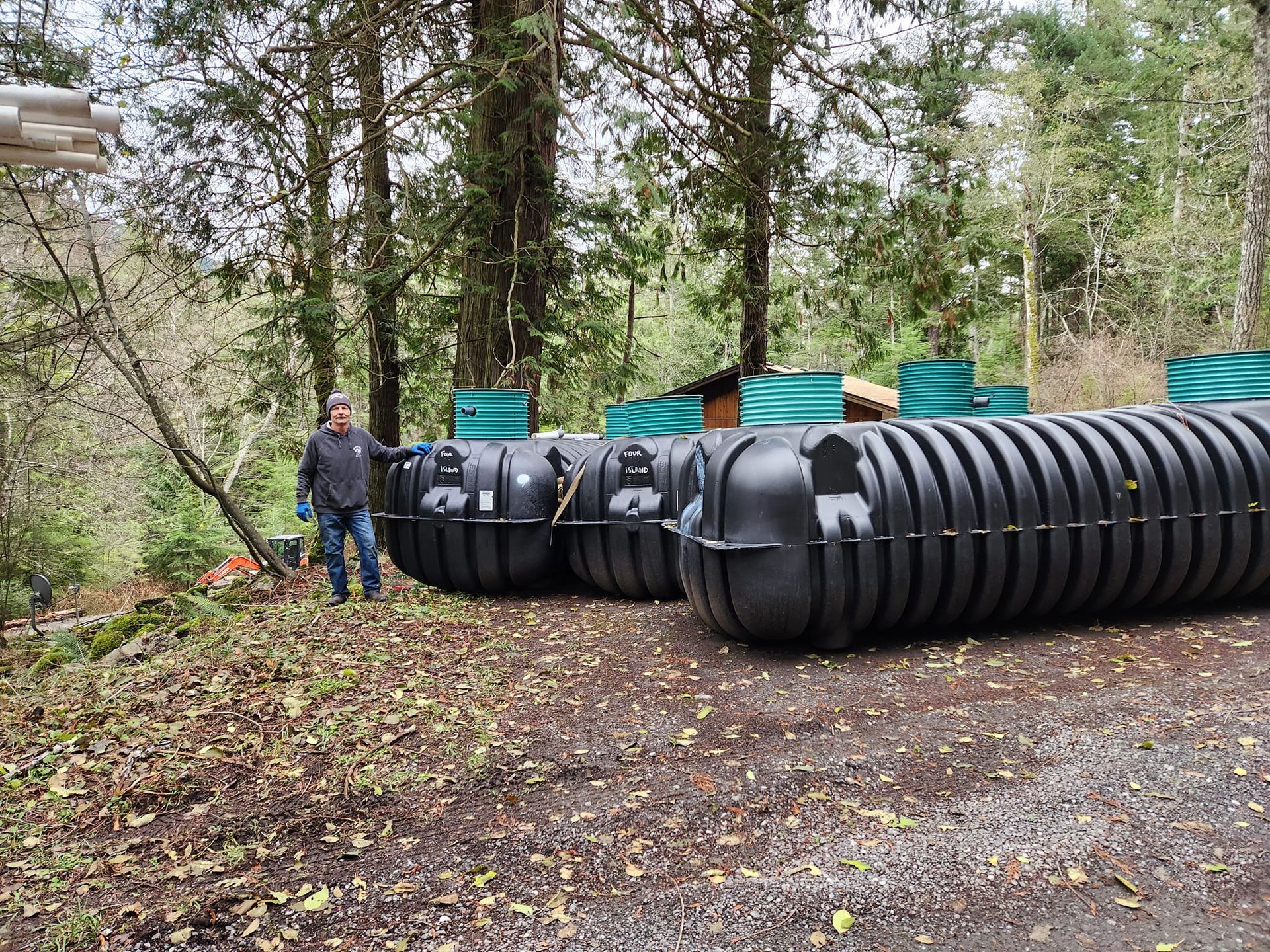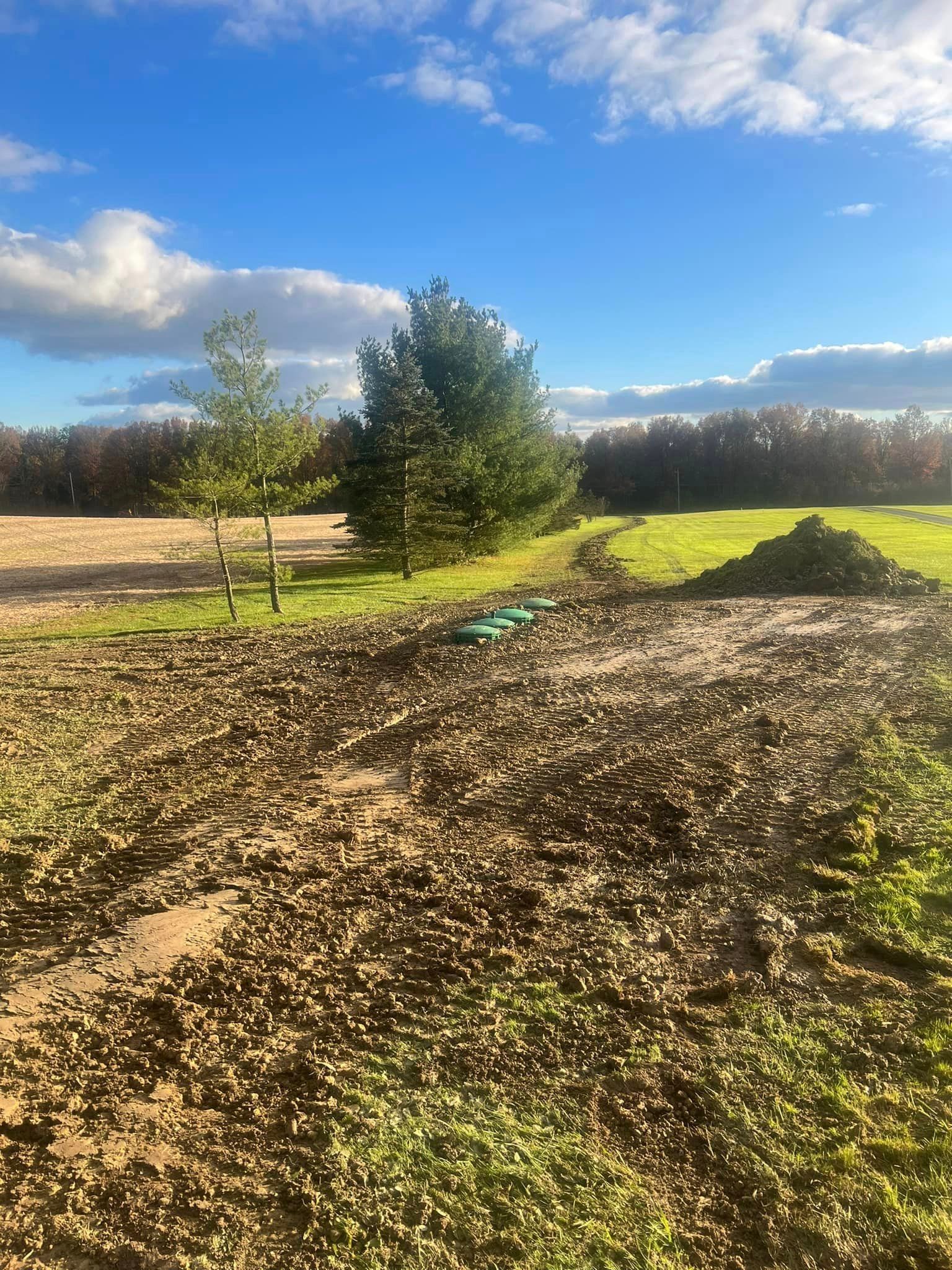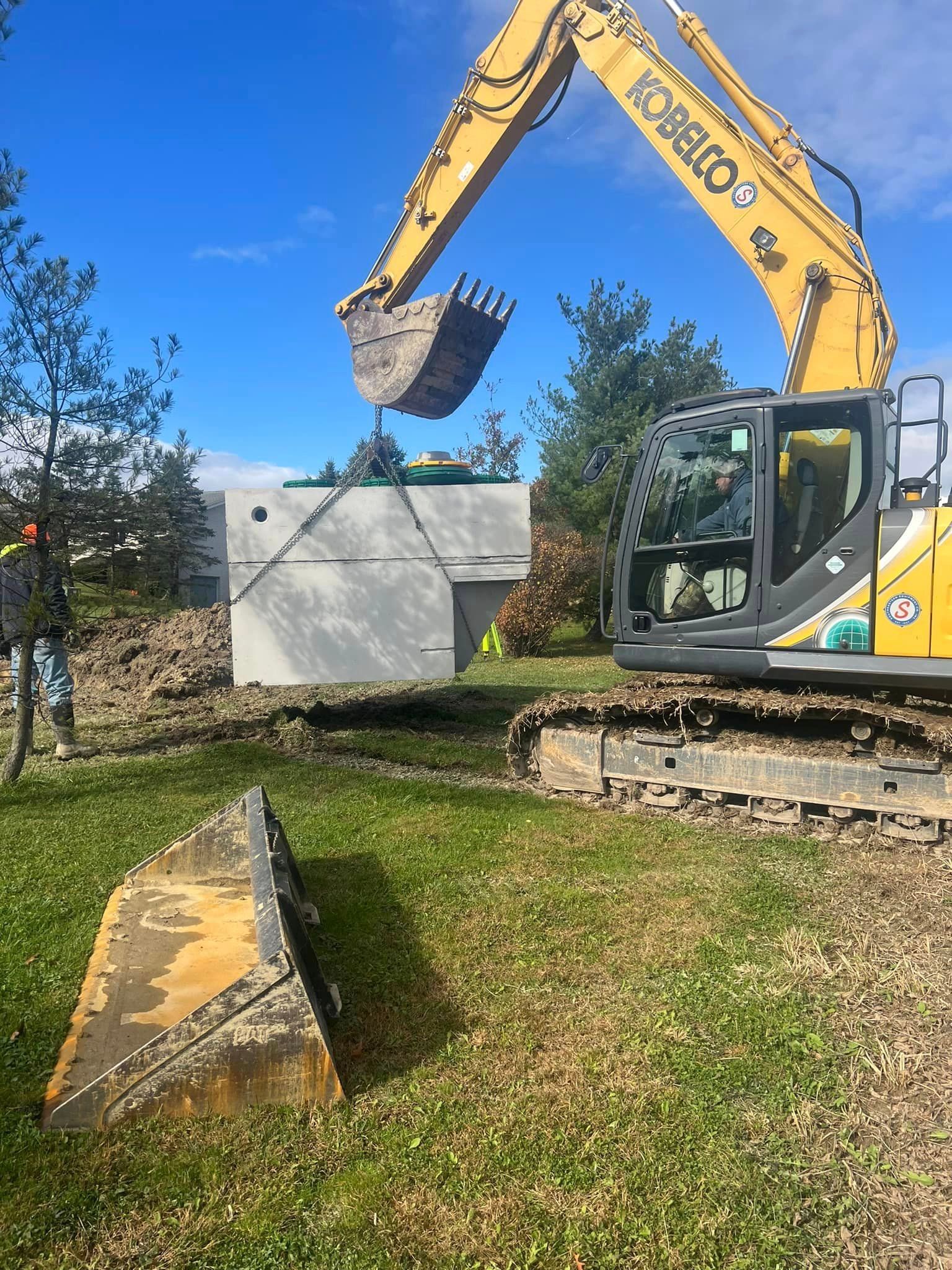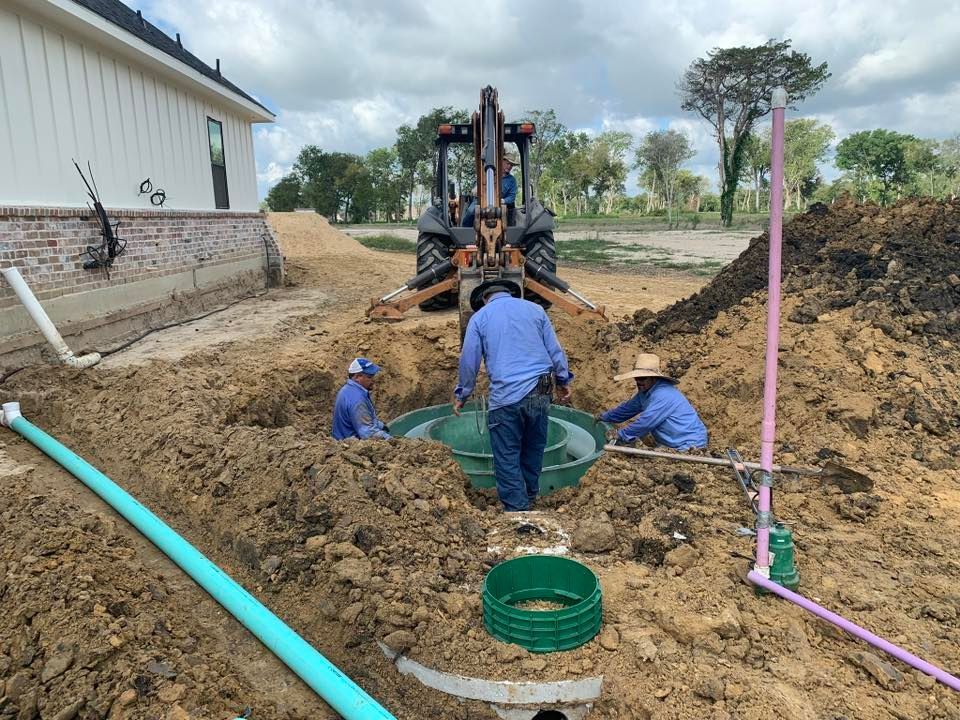Community Septic
Community Septic Systems
A community septic system is a shared wastewater treatment system. It serves multiple homes or buildings in areas without access to centralized sewer systems. At EWS Septic, we specialize in providing reliable and efficient community septic system solutions. Our goal is to ensure that residents and businesses in our service areas have access to safe and environmentally-friendly wastewater treatment options.
Importance of Community Septic Systems
Community septic systems play a crucial role in managing wastewater in areas where centralized sewer systems are not available. These systems provide a cost-effective and sustainable solution for communities. They ensure proper treatment and disposal of wastewater. By using community septic systems, homeowners and businesses can help preserve groundwater quality. This also supports the overall well-being of the community.
How Community Septic Systems Work

Basic Functioning
A community septic system collects wastewater from multiple sources, such as homes or buildings. It uses a shared septic tank. The septic tank separates solid waste from the liquid effluent. The effluent then flows into a drain field. It undergoes further treatment and filtration before being released into the soil.

Components Involved
A community septic system consists of several key components. These include septic tanks, which hold and separate solid waste. Drain fields facilitate filtration and absorption of the effluent. Distribution systems evenly distribute wastewater throughout the drain field. Regular maintenance and inspections are essential. They ensure these components function properly.

Role of Maintenance & Inspections
Regular maintenance and inspections are crucial to maintain the efficiency and longevity of a community septic system. This includes periodic pumping of the septic tanks to remove accumulated solids. It also includes inspections to identify any potential issues or signs of system failure. By following a maintenance schedule, community members can prevent costly repairs. They can also ensure the system continues to work.
Benefits You Get
Advantages Over Individual
Community septic systems offer several advantages over individual septic systems. One of the key benefits is cost-sharing. Sharing the costs of installation, maintenance, and repairs among multiple users significantly reduces the financial burden on each individual. Additionally, community septic systems often have access to professional management and maintenance services. This ensures optimal performance and peace of mind for residents.
Environmental Benefits
Community septic systems also provide environmental benefits. By treating wastewater at a local level, these systems help reduce the risk of groundwater contamination. Properly designed and maintained community septic systems can effectively remove harmful contaminants from wastewater. They protect the environment and preserve the quality of local water sources.
What to Consider
Factors to Consider
Implementing a community septic system requires careful consideration of various factors. Soil conditions, site selection, and regulatory requirements are among the key considerations. Soil should have adequate absorption capacity to allow for proper filtration and treatment of the effluent. When selecting a site, consider factors like proximity to water sources, topography. It is also important to comply with local regulations.
Challenges & Odor Issues
While community septic systems offer numerous benefits, there are also potential challenges to be aware of. Clearly define maintenance responsibilities, such as regular pumping and inspections. Allocate them among community members. Odor issues can arise if the system is not properly designed or maintained. However, with proper planning, design, and regular maintenance, you can effectively manage these challenges.
Cluster Septic Systems
Cluster Septic Systems
Cluster septic systems are a variation of community septic systems that serve smaller groups of homes or buildings. Unlike traditional community septic systems, cluster systems involve smaller-scale treatment and distribution systems. This allows for more flexibility in design and implementation. It's especially useful in areas with limited space or challenging soil conditions.
Benefits & Considerations
Cluster septic systems offer several benefits. They include reduced infrastructure costs and the ability to adapt to specific site conditions. However, they also require careful planning and design to ensure optimal performance. Additional regulations or design considerations may apply to cluster septic systems. Consult with experienced professionals, like EWS Septic, to ensure compliance and efficiency.
Community Septic Systems Pros & Cons
Pros
- Cost-sharing among community members
- Environmental benefits, such as reducing groundwater contamination
- Access to professional management and maintenance services
- Shared responsibility for maintenance and repairs
Cons
- Potential challenges in allocating maintenance responsibilities
- Odor issues if not properly designed or maintained
- Initial investment required for installation
- Compliance with local regulations and permits
Community Septic System Cost
Cost Factors
The cost of a community septic system installation and maintenance is variable, dependent on factors like system size, user count, and design intricacy. Ongoing maintenance and regular inspections are crucial for sustained effectiveness. These elements significantly impact the overall cost, emphasizing the need for meticulous planning and budgeting in community septic system projects. Careful consideration of these variables ensures efficient resource allocation, promoting the sustained functionality of the community septic infrastructure over time.
Cost Savings
While community septic systems require an initial investment, they can offer significant cost savings in the long run. Compared to individual septic systems, where each homeowner is responsible for their own system, community septic systems allow for cost-sharing among multiple users. This can make the overall cost more affordable for each individual. Community septic systems can be a cost-effective alternative to centralized sewer systems. They are especially useful in areas without such infrastructure.
Why Choose EWS Septic's Expertise?
At EWS Septic, we have extensive experience and expertise in Constructed Wetlands. We use them for Wastewater Treatment. Our team of professionals is dedicated to providing top-notch service and reliable solutions for community septic systems.
You can trust us to deliver exceptional results for your wastewater treatment needs. We have the knowledge and commitment to excellence.
Community Septic System FAQs
-
Can a community septic system be expanded to accommodate future growth?
Yes, community septic systems can be designed with expansion in mind. During the initial design phase, considering future growth projections allows for easy system expansion to accommodate more users.
-
How is responsibility for maintenance and repairs divided among community members?
Community members typically divide responsibility for maintenance and repairs, based on an agreed-upon plan. This plan may include regular inspections and scheduled pumping. It will also have guidelines for addressing any issues that may arise.
-
How is the maintenance and monitoring of a community septic system managed?
A professional service provider, such as EWS Septic, typically manages the maintenance and monitoring of a community septic system. They will ensure that regular inspections, pumping, and necessary repairs are carried out. This will maintain the system's functionality.
-
Are there backup or emergency systems in place for community septic systems?
Yes, community septic systems can have backup or emergency systems. They ensure continued functionality during power outages or other unforeseen circumstances. These backup systems may include generators or alternative treatment options.
-
Can a community septic system be designed for both residential and commercial use?
Yes, community septic systems can be designed to accommodate both residential and commercial use. The system's capacity and design will depend on the specific needs and requirements of the community.
Schedule Now
Contact us promptly for immediate assistance with community septic systems
Choose EWS Septic for exceptional community septic solutions. Benefit from our extensive expertise, unwavering professionalism, and comprehensive approach in effectively addressing your septic concerns. Contact us today to schedule prompt and efficient service or gather information about our dedicated offerings.
We are committed to excellence and reliability in handling your community septic system needs.
All Rights Reserved | EWS Septic

